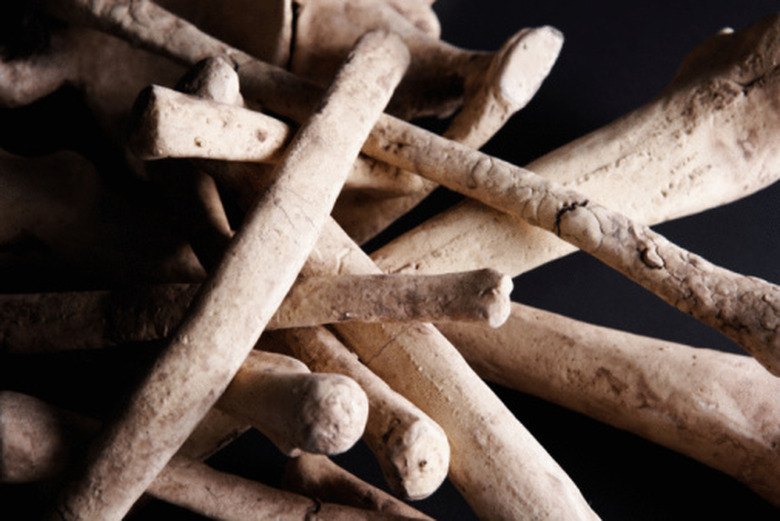How To Crush Bone To Make Bone Meal
Bone meal is a popular organic fertilizer for gardens and flower beds, consisting of the ground-up bones of livestock. It contains nitrogen and phosphorous to nourish plants, as well as calcium, an important mineral for perennials. In addition, it is a natural slow-release fertilizer, releasing nutrients into the soil as the bone decomposes. It is a relatively simple task to make your own bone meal using leftover bones from cooking.
Step 1
Clean the meat and fatty tissue from leftover bones. If you can't remove all the tissue by scraping, boil the bones until they are clean.
Step 2
Bake the bones at 400°F until they are thoroughly dry and brittle, about an hour for most small to medium bones. Set aside until cool.
- Bone meal is a popular organic fertilizer for gardens and flower beds, consisting of the ground-up bones of livestock.
Step 3
Place the bones in a heavy tear-proof sack, preferably canvas. Using a rolling pin or meat tenderizer, smash the dried bones into fragments no larger than 1 inch.
Step 4
Grind the bones in a coffee grinder or blender set to pulse.
Make Liquid Bone Meal Fertilizer
Collect or purchase the bones you intend to use for your bone meal. Remove as much meat, gristle and other material from the bones as you can. Wearing safety glasses, pound the bones with a metal mallet to break them into smaller pieces. While this will not make bone pieces small enough for use as bone meal, grinding the small pieces of bone will be much easier than attempting to grind whole bones. Test your soil to determine its current nutrient composition so you'll know how much bone meal and water you should combine to make your liquid fertilizer. Mix the bone meal with water in a pot over medium heat. Test the nutrient content of your soil a few days after each application of fertilizer to monitor its changes over time.
- Place the bones in a heavy tear-proof sack, preferably canvas.
- Using a rolling pin or meat tenderizer, smash the dried bones into fragments no larger than 1 inch.
Things Needed
- Oven
- Heavy canvas bag
- Rolling pin or meat tenderizer
- Blender or coffee grinder
Warning
Don't attempt to smash or crush bones without enclosing them in a tear-proof sack. Flying bone fragments can cause serious damage to the eyes and can even nick unprotected skin.
Tip
A coarse bone meal will release its nutrients more slowly, while a fine powder will break down more quickly, providing a more powerful but short-lived nutrient boost. Bone meal may be added to your compost heap or mixed directly with the soil around the base of your plants. Poultry bones are easier to crush and grind than beef or pork bones. Keep this in mind if you lack a powerful blender or grinder.
